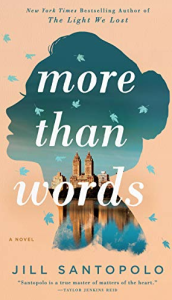The Lilith Blog 1 of 2
January 9, 2020 by Yona Zeldis McDonough
After She Lost Her Father, She Found Him
 In More Than Words (Putnam), Jill Santopolo’s newest novel, Nina Gregory faces a double loss—the death of her beloved father and the shattering of her illusions when she discovers that he wasn’t at all the man she thought he was. Santopolo talks with Fiction Editor Yona Zeldis McDonough about what she and her protagonist share—and what they don’t.
In More Than Words (Putnam), Jill Santopolo’s newest novel, Nina Gregory faces a double loss—the death of her beloved father and the shattering of her illusions when she discovers that he wasn’t at all the man she thought he was. Santopolo talks with Fiction Editor Yona Zeldis McDonough about what she and her protagonist share—and what they don’t.
YZM: Your mother is Jewish and your father was Christian; how did that shape your characters?
JS: In my novel, More Than Words, two of the main characters have parents from different places with differing traditions. Nina’s mother’s family is from Greece and her father’s family is from Wales, and Rafael’s mother’s family is from Ireland and his father’s family is from Cuba. Nina and Rafael connect, at one point in the book, when they talk about what it means to feel that duality of identity. That experience, of dual identity, is something that I felt growing up–and still feel today–and the conversation they have was inspired by one that I had with my husband, whose background is the same as mine but reversed. Even though I’ve written many other books, this is the first time that I wrote about that experience, and even though Nina and Rafael’s dual identities don’t match my own, the essence of what it feels like to have a family that’s not simply one thing or another is the same.
YZM: We never learn the religion of Nina, the main character, but we do find out that her best friend Leslie is Jewish; care to comment?
JS: When people in my family have died, the religion they were practicing at that point in time affected the way that they were mourned and buried. By the time my father died, he had converted to Judaism, so his funeral was in a synagogue and we sat shiva for him. I read a lot about Jewish death rituals at that time, and his death, for me, was connected to Judaism, so I wanted to be able to work that into Nina’s story. But I felt that making Nina Jewish would make her story too difficult for me to write, because it would be too close to my own. Making Leslie Jewish seemed to be the way to work in Judaism without feeling too connected to the main character’s story.
YZM: Nina sees herself chiefly as a daughter at the outset of the novel; how does she see herself by the end?
JS: I think Nina will always see herself as her father’s daughter, but not as her primary identity. At the end, she sees herself as her own person who, while shaped by her father, is not defined by him.
YZM: Is it Nina’s task to learn to love her father despite his failings? Or because of them?
JS: I think love is complicated–and often involves choosing to (or not to) love for various reasons. Nina learns, in the novel, that part of continuing to love her father means understanding him and forgiving his mistakes, even if she doesn’t approve of or agree with what he’s done.
YZM: Where do you see yourself heading next as a writer?
JS: I love writing about love–of all kinds–and am working on a new novel now about a few different kinds of love I haven’t written about before. The novel is called Everything After and is about marital love, maternal love, and love of music, too. And it’s about how decisions we make in our 20s can come back to haunt our lives later on. And the main character in that book actually does happen to be Jewish.
 Please wait...
Please wait...